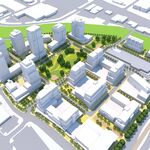“The demographics are changing, with younger people not owning as many cars,” Brian Abbanat told Digital Trends. Abbanat is a senior transportation planner for the city of Davis in California, which is considered one of the most progressive cities in the U.S. when it comes to transportation; it was one of the first municipalities to create dedicated bicycle lanes back in 1967.
Still, it’s a challenge to predict what a city’s parking needs may be decades into the future.
“And technologies come and go. Fuel cells were going to be big, then there was the Segway, now it’s the e-bike sharing systems,” Abbanat said. So in the short term, Davis is looking to charge for street parking downtown, hoping to manage supply and demand. Abbanat said the city is looking at dynamic pricing (higher prices during peak hours) and pay-by-app solutions to mitigate “ticket anxiety.”
As for the long term, Davis is not planning on building any parking garages. Outside consultants agree that the coming trends argue against it, with the mayor of Davis, Brett Lee, recently pointing out that a municipal garage would cost roughly $15 million and the city would have to increase property taxes for five years to cover the cost.
Moreover, there are many benefits that result from choosing not to build parking lots.
Un-paving paradise
“It’s not just about the car industry,” Esther Bahne, head of strategy and innovation at
Mini, told Digital Trends. “It’s about the whole environment. Getting rid of parking lots, for example, can free up streets, allow for more parks and less pollution.” Bahne, who has worked in the auto industry for over 14 years, said the coming changes of electrification, ride sharing, and autonomous vehicles require creative ideas in cities in order to plan for the future.




